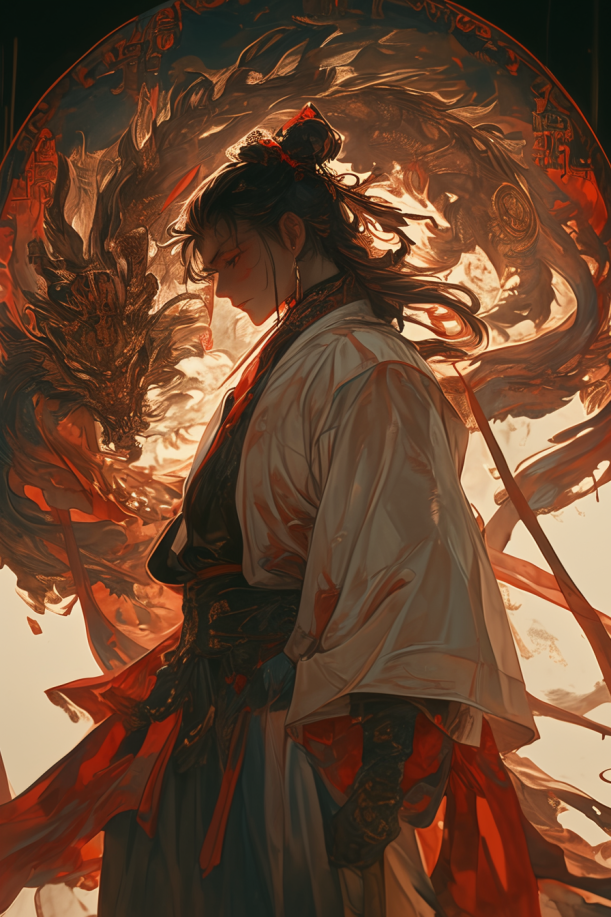Chapter 12
“Brother Carter, look quickly.”
In the densely packed bookshelves, there were rows upon rows of books.
The first to catch the eye was a book titled "From Beginner to Foundation Establishment."
Next was "Top Scorer of Shangling Exam Teaches You How to Prepare."
Then came "Anecdotes of the Academy: The Grudges and Feuds Between the Confucian and Immortal Institutes."
“The shopkeeper said, if you thoroughly study these books from his store, you’re guaranteed to get into the academy.”
Evan Carter: “......”
For a moment, he felt as if he had returned to his original world, clutching his college entrance exam admission ticket, picking out reference materials at a small bookstore next to the school.
He carefully looked through them, and finally pulled out a copy of "Bai Xiaosheng’s Detailed Account of Shangling Academy."
The vertical text wasn’t hard to read; he used to study secret manuals this way.
—Shangling Academy is located in Shuzhou and is the number one academy in Nanxia. Every June, the “Shangling Exam” is held throughout Nanxia, and about a thousand people can pass the exam and enter the academy.
But Shangling Academy is not just a place for cultivating immortality, or rather, cultivation is only one part of the academy.
The entire academy is divided into three parts: Immortal, Confucian, and Technical, known as the Immortal Institute, Confucian Institute, and Technical Institute.
When Walter wrote about this, he mentioned an anecdote: originally, the academy was divided into many parts—Dao, Martial, Confucian, Alchemy, Artifacts, Music... too many to count.
Later, those who studied Dao accumulated spiritual power with nowhere to vent it, so they went to learn martial arts. Those who studied martial arts, after mastering physical techniques, realized human strength was ultimately limited, so they turned to Daoist methods to support their martial arts. Eventually, the two institutes became so mixed up that it was hard to tell them apart, so they simply merged into the Immortal Institute. As for Alchemy, Artifacts, Music, Spirit Writing, Stargazing—each had so few students every year that anyone with a bit of talent went to the Immortal Institute for martial arts and immortality, and anyone with ambition went to the Confucian Institute to learn how to bring peace to the world. The remaining institutes dwindled, each with at most two or three people, and in the end, they had to merge just to barely maintain appearances—though things were still quite bleak.
Evan Carter suddenly felt he might still have a chance to save himself.
Since there were institutes besides the Immortal Institute, he could choose something like Alchemy or Formations, and spend the next two months frantically memorizing recipes or formation diagrams. Maybe he really could pass the Shangling Exam and enter the academy.
Walter wrote in the book that after entering, the academy holds an assessment every six months, and if you fail twice in a row, you’ll be expelled. By then, he could cram like during finals week, and maybe avoid being kicked out.
However, this idea was completely overturned the moment he turned the page and began reading the specific procedures of the Shangling Exam.
Chapter 7: The Shangling Dreamscape
According to Walter, because the Shangling Exam has so many complicated components—the Confucian Institute’s test requires policy questions and essay writing, the Immortal Institute’s test observes each candidate’s talent in controlling spiritual power and understanding martial arts techniques, and the Technical Institute is even harder, requiring alchemy and real stargazing... so many tests, and with so many applicants, if each were assessed in detail, it would consume an unimaginable amount of manpower, materials, and time. To solve this, Shangling Academy gathered all the formation masters in Nanxia to create a grand formation: the “Shangling Dreamscape.”
Once the formation is activated, everyone is pulled into the Shangling Dreamscape by the power of illusion, and all academy exams are held there, whether it’s the Shangling Exam or the biannual assessments.
—It turns out this is a computerized test.
Evan Carter’s heart skipped a beat, and he quickly turned the page.
The next page detailed the Confucian Institute’s exam process in the Shangling Exam, so Evan Carter flipped a few more pages to the Immortal Institute section.
There are three parts to the exam, and the explanations are very straightforward.
First Test: “A tree that embraces the sky grows from a tiny sprout; a tower a hundred feet tall begins with a mound of earth. Cultivation must start with nurturing one’s energy.”
All students sit in meditation within the Shangling Dreamscape, first circulating their energy through all 720 acupoints in the body. Then, the dreamscape will randomly designate several acupoints, and the student must choose the meridian paths to circulate energy through them, repeating this five times. Finally, the dreamscape will add blockages or obstacles in the meridians and acupoints, and the student must choose whether to break through or bypass the obstacles, figuring out how to keep their internal energy flowing smoothly despite the hindrances.
Second Test: “The Dao is not the Dao, nor is it not the Dao. Cultivation requires enlightenment.”
This test purely examines one’s level of insight. The dreamscape will select twenty essential phrases from various classics, and the student must explain their understanding of each. Then, the dreamscape will pull two students with opposing viewpoints into the same dream, where they will debate the Dao.
Third Test: “Lower martial arts focus on skill, middle martial arts on philosophy, upper martial arts on the Dao; martial arts and Dao are inseparable.”
Upon entering the third test, the dreamscape shifts, and students choose their preferred weapon, then demonstrate their martial arts in twelve scenarios: morning, dusk, noon, night; spring, summer, autumn, winter; cloudy, sunny, rainy, snowy. Walter adds a note here: martial prowess is secondary; the key is one’s insight into the Dao through martial arts. Those with high insight, even if wielding an axe, are different from those with low insight.
